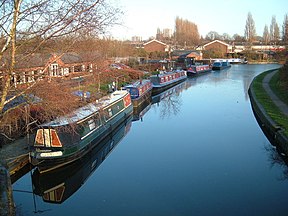Daw End Branch Canal
| Wyrley and Essington Canal | |
|---|---|

Sneyd Wharf on the Wyrley and Essington Canal
|
|
| Specifications | |
| Maximum boat length | 70 ft 0 in (21.34 m) |
| Maximum boat beam | 7 ft 0 in (2.13 m) |
| Locks | 0 (originally 39) |
| Status | Most navigable |
| Navigation authority | Canal and River Trust |
| History | |
| Original owner | Birmingham Canal Navigations |
| Principal engineer | William Pitt |
| Date of act | 1792, 1794 |
| Date completed | 1797 |
| Date closed | Sneyd Branch 1900s, parts in 1955 |
| Geography | |
| Start point | Wolverhampton |
| End point | Huddlesford Junction near Lichfield |
| Branch(es) | Sneyd, Cannock Extension, Daw End, Chasewater |
The Wyrley and Essington Canal, known locally as "the Curly Wyrley", is a canal in the English Midlands. As built it ran from Wolverhampton to Huddlesford Junction near Lichfield, with a number of branches: some parts are currently derelict. Pending planned restoration to Huddlesford, the navigable mainline now terminates at Ogley Junction near Brownhills. In 2008 it was designated a Local Nature Reserve.
The canal was built to allow transport of coal from coal mines near Wyrley, Essington and New Invention to Wolverhampton and Walsall, but also carried limestone and other goods. An Act of Parliament received the Royal Assent on 30 April 1792, entitled "An Act for making and maintaining a navigable Canal from, or from near, Wyrley Bank, in the county of Stafford, to communicate with the Birmingham and Birmingham and Fazeley Canal, at or near the town of Wolverhampton, in the said county; and also certain collateral Cuts therein described from the said intended Canal".
As the act's name suggests, this authorised the construction of the canal from the BCN Main Line of the Birmingham Canal Navigations (which would not be known as such until 1794) near Wolverhampton to Wyrley Bank, and the raising of up to £45,000 to pay for construction. William Pitt was appointed engineer.
A second act received Royal Assent on 28 March 1794, entitled "An Act for extending the Wyrley and Essington Canal" – this authorised a long extension, from Sneyd (thus making the line from Sneyd to Wyrley Bank effectively a branch) past Lichfield to Huddlesford Junction on the Coventry Canal, together with the raising of up to £115,000 (equivalent to £11,915,278 in 2015), to complete construction. The 1794 Act also authorised a branch to the Hay Head Limeworks, which became known as the Daw End branch, and a short branch to Lords Hayes.
...
Wikipedia
